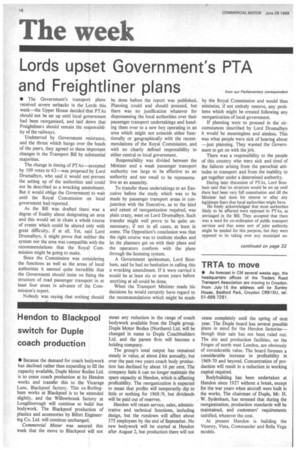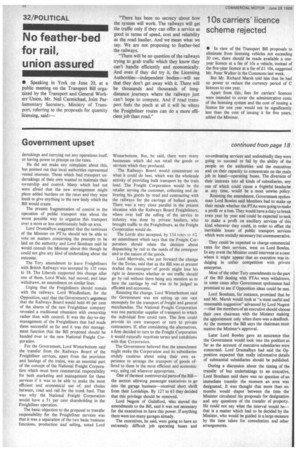Lords upset Government's PTA
Page 20

Page 34

If you've noticed an error in this article please click here to report it so we can fix it.
and Freightliner plans from our Parliamentary correspondent
• The Government's transport plans received severe setbacks in the Lords this week—the Upper House decided that PTAs should not be set up until local go ernment i had been reorganized, and laid d wn that Freightliners should remain the re ponsibility of the railways.
Undeterred by Government r sistance, and the threat which hangs over t e heads of the peers, they agreed to these iIiportant changes in the Transport Bill by substantial majorities.
The change in timing of PTAs—accepted by 109 votes to 62—was proposed by Lord Drumalbyn, who said it would not prevent the setting up of the authorities and could not be described as a wrecking am ndment. But it would oblige the Governmen to wait until the Royal Commission o local government had reported.
As the Bill was drafted there was a degree of finality about designating an area and this would set in chain a whol course of events which could be altered only with great difficulty, if at all. Yet, sa d Lord Drumalbyn, it might prove that neither the system nor the area was compatible with the recommendations that the Roya Commission might be going to make.
Since the Commission was considering the functions as well as the areas Of local authorities it seemed quite incredible that the Government should insist on flung the structure of road passenger transport in at least four areas in advance of th Commission's report.
Nobody was saying that nothing should be done before the report was published. Planning could and should proceed, but there was no justification whatever for dispossessing the local authorities over their passenger transport undertakings and handing them over to a new boy operating in an area which might not coincide either functionally or geographically with the recommendations of the Royal Commission, and with no clearly defined responsibility to either central or local government.
Responsibility was divided between the Minister and a weak passenger transport authority too large to be effective as an authority and too small to be representative as an assembly.
To transfer these undertakings to an Executive before the study which was to be made by passenger transport areas in conjunction with the Executive, as to the kind and extent of reorganization required, was plain crazy, went on Lord Drumalbyn. Such transfer might well prove to be quite unnecessary, if not in all cases, at least in some. The Opposition's conclusion was that the right course was to institute studies and let the planners get on with their plans and the operators conform with the plans through the licensing system.
A Government spokesman, Lord Stonham, said he had no hesitation in calling this a wrecking amendment. If it were carried it would be at least six or seven years before anything at all could be done.
When the Transport Minister made his decisions he would certainly have regard to the recommendations which might be made by the Royal Commission and would thus minimize, if not entirely remove, any problems which might be created following any reorganization of local government.
If planning were to proceed in the circumstances described by Lord Drumalbyn it would be meaningless and aimless. This was what people were sick of hearing about —just planning. They wanted the Government to get on with the job.
There was a responsibility to the people of this country who were sick and tired of the failures arising from the parochial attitudes to transport and from the inability to get together under a determined authority.
During later discussion of PTAs, Lord Stonham said that no structure would be set up until there had been very full consultation and till the Minister had done his utmost to allay any legitimate fears that local authorities might have.
He freely acknowledged that most authorities likely to be affected were opposed to PTAs, as envisaged in the Bill. They accepted that there was a need for co-ordination of public transport services and that some sort of joint authority might be needed for this purpose, but they were opposed to its taking over any municipal un dertakings and carrying out any operations itself, or having power to precept on the rates.
He did not make any complaint about this, but pointed out that local authorities represented vested interests. Those which had transport undertakings of their own wanted to maintain their ownership and control. Many which had not were afraid that the new arrangement might place added burdens on the rates and they were loath to give anything to the new body which the Bill would create.
The present fragmentation of control in the operation of public transport was about the worst possible way to organize this transport over a more or less continuously built-up area.
Lord Drumalbyn suggested that the nominees of' the Minister on PTAs should not be able to vote on matters concerning the precepts to be laid on the authority and Lord Stonham said he would consult the Minister about this though he could not give any kind of undertaking about the outcome.
The Tory amendment to leave Freightliners with British Railways was-accepted by 135 votes to 58. The Liberals supported this change after one of them, Lord Wade, had moved, and later withdrawn, an amendment on similar lines.
Urging that the Freightliners should remain with the railways, Lord Windlesham, for the Opposition, said that the Government's argument that the Railways Board would hold 49 per cent of the, shares of the new Freightliner company revealed a traditional obsession with ownership rather than with control. It was the day-to-day management of the Freightliners that had made them successful so far and it was this management function that the Bill proposed should be handed over to the new National Freight Corporation.
For the Government. Lord Winterbottom said the transfer from the Railways Board of the Freightliner services, apart from the provision and haulage of the trains, was an essential part of the concept of the National Freight Corporation which must have commercial responsibility for both marketing and management for these services if it was to be able to make the most efficient and economical use of, and choice between, road and rail for the trunk haul. That was why the National Freight Corporation would have a 51 per cent shareholding in the Freightliner operation.
The basic objection to the proposal to transfer responsibility for the Freightliner services was that it was a separation of the two basic business functions, production and selling, noted Lord Winterbottom. But, he said, there were many businesses which did not retail the goods or services which they produced.
The Railways Board would concentrate on what it could do best, which was the wholesale activity of providing bulk transport by the train load. The Freight Corporation would be the retailer serving the customer, collecting and delivering his goods by road and contracting with the railways for the carriage of bulked goods. There was a very close parallel in the present situation with the Railways Board Freightliners, where over half the selling of the service to industry was done by private hauliers, who brought traffic to the Freightliners, as the Freight Corporation would do.
The Lords also accepted, by 134 votes to 67 an amendment which says that the Freight Corporation should relate the decision about dispatching by rail to the needs of the consignor and to the nature of the goods.
Lord Merrivale, who put forward the change for the Tories, said that as the Bill was at present drafted the consignor of goods might lose his right to determine whether or not traffic should go by rail without there being any mention as to how the carriage by rail was to be judged as efficient and economic.
Resisting the change, Lord Winterbottom said the Government was not setting up one vast monopoly for the transport of freight and general merchandise. The National Freight Corporation was one particular supplier of transport to which the individual firm could turn. The firm could provide its own transport or turn to private contractors. If, after considering the alternatives, a firm decided to turn to the Freight Corporation it would naturally negotiate terms and conditions with that Corporation.
The Government believed that the amendment might make the Corporation and its subsidiaries unduly cautious about using their own experience to arrange the transport of goods offered to them in the most efficient and economic way, using rail wherever appropriate.
One of themost controversial parts of the Bill— the section allowing passenger executives to go into the garage business—received short shrift from their Lordships. By 127 to 63 they decided that this privilege should be removed.
Lord Nugent of Guildford, Who moved the amendments to the Bill, said it was not necessary for the executives to have this power. If anything there were too many garages already.
The executives, he said, were going to have an extremely difficult job operating buses and co-ordinating services and undoubtedly they were going to succeed or fail by the ability of the people on the authorities and the executives and on their capacity to concentrate on the main job in hand—operating buses. The diversion of their interests into all kinds of subsidiaries, any one of which could cause a frightful headache at any time, would be a most unwise policy.
Resisting the amendment, Government spokesman Lord Bowles said Members had to make up their minds whether the PTAs were going to make a profit or a loss. They would have a duty to break even year by year and could be expected to seek to make a profit on ancillary services of this kind wherever they could, in order to offset the inevitable losses of public transport services which were socially necessary but unremunerative.
They could be expected to charge commercial rates for their services, went on Lord Bowles. In any event the Minister could intervene in a case where it might appear that an executive was indulging in unfair competition with private enterprise.
Most of the other Tory amendments to the part of the Bill dealing with PTAs were withdrawn, in some cases after Government spokesmen had promised to see if Opposition ideas could be met.
Lord Stonham, for instance, promised that he and Mr. Marsh would look at "a most useful and reasonable suggestion" advanced by Lord Nugent —that the members of an executive should choose their own chairman with the Minister making the appointment only when there was a deadlock. At the moment the Bai says the chairman must receive the Minister's approval.
Later Lord Bowles gave an assurance that the Government would look into the position as far as the account of executive subsidiaries were concerned. Lord Drumalbyn had said the Opposition expected that really informative details of substantial subsidiaries should be published.
During a discussion about the timing of the transfer of bus undertakings to an executive, Lord Stonham said there was no question of an immediate transfer the moment an area was designated. It was thought that more than six months would elapse between the time the Minister circulated his proposals for designation and any questions of the transfer of property. He could not say what the interval would he— that is a matter which had to be decided by the Minister, who would be guided in a large measure by the time taken for consultation and other arrangements.
























































































































